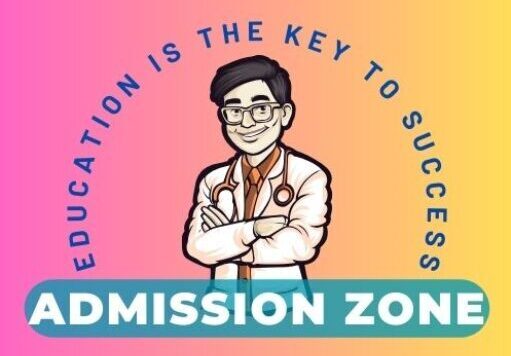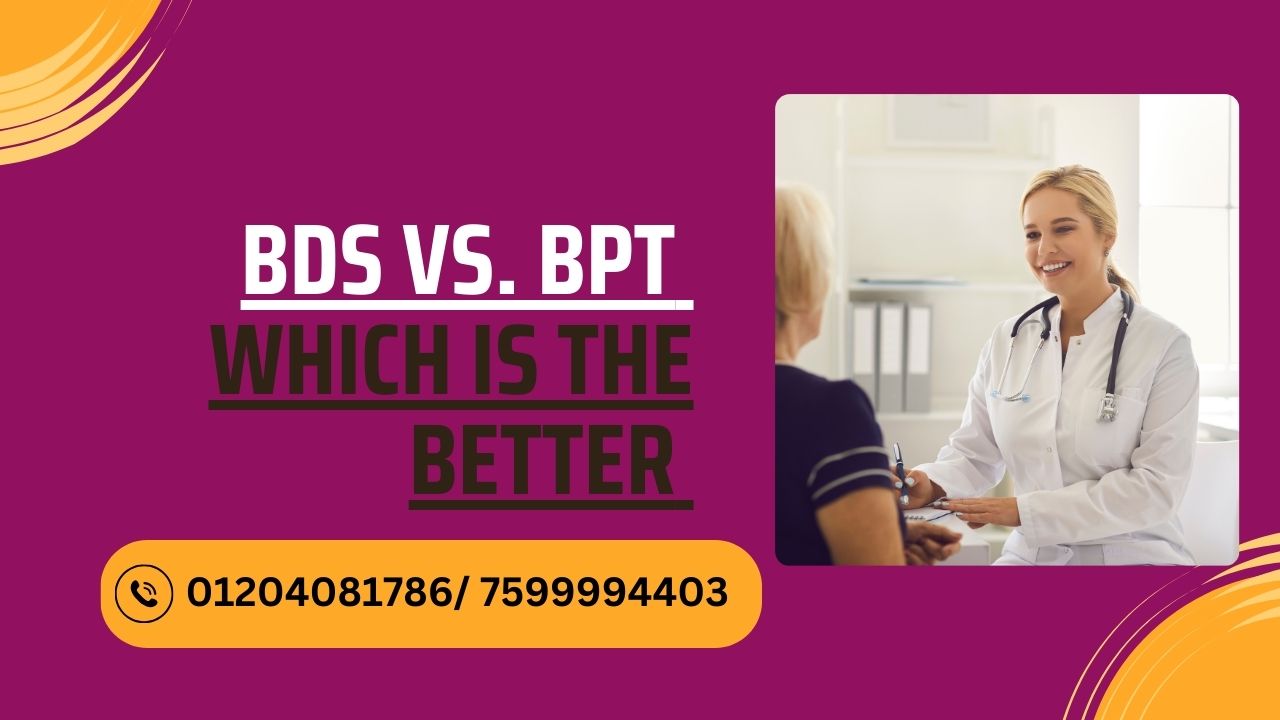Choosing the right medical career after school is a important decision for anyone interested in healthcare industry. If you’re unsure whether to go for BDS (Bachelor of Dental Surgery) or BPT (Bachelor of Physiotherapy), this article will help you make a choice. BDS vs. BPT: Which is the Better option really depends on your personal interests, career goals, and lifestyle. Both options have their pros and cons, so understanding each can help you pick the one that fits you best and in this article we will try to answer this question.
BDS vs BPT: Which is Better?
| Factor | BDS (Bachelor of Dental Surgery) | BPT (Bachelor of Physiotherapy) |
|---|---|---|
| Course Duration | 5 years (including internship) | 4 years (including internship) |
| Field of Study | Dentistry, focusing on oral health, teeth, and gums | Physiotherapy, focusing on rehabilitation, physical therapy, and mobility |
| Career Options | Dentist, Orthodontist, Dental Surgeon, Dental Researcher | Physiotherapist, Sports Therapist, Rehabilitation Specialist, Clinical Physiotherapist |
| Work Environment | Mostly in dental clinics, hospitals, or private practice | Hospitals, rehabilitation centers, sports clinics, and home healthcare |
| Salary Potential | ₹3 – 8 Lakhs per annum (varies based on experience, location, and specialization) | ₹3 – 6 Lakhs per annum (varies based on experience, location, and specialization) |
| Job Demand | High demand for dental professionals, especially in urban areas | Growing demand, particularly in sports, rehabilitation, and elderly care |
| Skills Required | Good hand-eye coordination, precision, patience, communication skills | Good physical stamina, empathy, communication skills, patience, and motivation skills |
| Work Flexibility | Flexibility for private practice or working in a clinic/hospital | Generally more flexible hours, with opportunities in both private practice and hospitals |
| International Recognition | Widely recognized, especially in countries with high demand for dental professionals | Widely recognized with good opportunities, especially in rehabilitation-focused countries |
| Pros | High earning potential in private practice, respected profession, and job stability | Growing demand in rehabilitation fields, more hands-on care, flexible work settings |
| Cons | High initial investment in setting up a private practice, long work hours, dealing with patients’ anxiety | Lower salary potential compared to BDS, physically demanding work, dealing with injured or disabled patients |
What is BDS (Bachelor of Dental Surgery)
BDS is a professional undergraduate degree in dental surgery for students with the knowledge and skills to diagnose, treat, and prevent oral health issues. It’s a medical field dedicated to dentistry, which includes areas like oral hygiene, restorative dental procedures, cosmetic dentistry, and oral surgery.
What is BPT (Bachelor of Physiotherapy)
BPT is an undergraduate degree that focuses on the physical rehabilitation of individuals who suffer from mobility issues, physical disabilities, or injuries. Physiotherapists are trained to help patients recover or improve physical functions using physical techniques such as exercises, massages, and manual therapy.
Course Structure and Duration of BDS
The BDS program is usually for 5 years which includes 4 years of coursework along with 1 year of compulsory internship. The course focuses on various subjects like oral anatomy, oral pathology, pharmacology, and surgical techniques. It’s a combination of theoretical learning and practical clinical training. During internships, students get experience in dental clinics, treating patients under supervision.
Career Opportunities in BDS
BDS graduates can work as dentists in hospitals, private clinics, and government healthcare institutions. They can specialize in areas like orthodontics, prosthodontics, oral surgery, or periodontology. Also, they can run their own private dental practice or join research institutions.
Course Structure and Duration of BPT
A BPT program usually lasts for 4 years, followed by a 6-month internship. The curriculum includes subjects like anatomy, physiology, biomechanics, kinesiology, exercise therapy, and neuro-physiotherapy. BPT students also spend some time in hospitals and clinics during their internship, applying theoretical knowledge in a practical life.
Career Opportunities in BPT
After completing a BPT program, graduates can work as physiotherapists in various places like hospitals, rehabilitation centers, sports clinics, and private clinics. They can also specialize in areas such as orthopedic physiotherapy, neurological physiotherapy, or sports physiotherapy. BPT graduates also have the option to start their higher studies like MPT (Master of Physiotherapy) for career advancement.
Which Field Has More Scope
- Scope of BDS in India and Abroad
Dentistry has a wide scope, both in India and abroad. In India, oral health awareness is increasing day by day, and more people are seeking professional dental services. With the rise in cosmetic dentistry and orthodontic treatments, there is an increasing demand for dental professionals. Also, especially in countries like the United States and Canada, dentists have higher earning potential and are in high demand due to the aging population and their increased focus on oral health.
- Scope of BPT in India and Abroad
The scope of BPT has also increased, especially with the growing focus on rehabilitation, sports centre and physical therapy. Physiotherapists are in demand in hospitals, sports clinics, fitness centers, and wellness centers. Sports physiotherapy is rapidly gaining popularity, particularly athletes and fitness enthusiasts. In abroad, physiotherapists are highly valued, with countries like Australia, the UK, and the US having high demand for trained physiotherapists.
Job Prospects and Earnings
- Job Prospects for BDS Graduates: BDS graduates can work in private or government hospitals, dental clinics, or pursue specializations such as orthodontics, endodontics, or oral surgery. Many BDS graduates also choose to run their own private practice. The salary for a dentist varies depending on location, specialization, and experience, but it is generally higher than BPT.
- Job Prospects for BPT Graduates: Physiotherapy graduates can work in hospitals, sports clinics, rehabilitation centers, and private clinics. Physiotherapists can also work in sports teams, fitness centers, or corporate wellness programs. BPT professionals generally earn less than BDS professionals, but the field offers steady growth and job satisfaction.
Which Is More Challenging
- Challenges in Pursuing BDS: BDS is a challenging course as it requires a deep understanding of human anatomy, surgical procedures, and dental techniques. Dental surgery involves working with delicate oral structures, which requires a high level of precision and attention to detail.
- Challenges in Pursuing BPT: BPT requires students to develop an understanding of the musculoskeletal and neurological systems and to master the art of rehabilitation. Physiotherapists must be compassionate, patient, and capable of working with individuals of all ages.
Academic and Practical Skills Required
- Skills for BDS Graduates: To be successful in the field of dentistry, a BDS student needs to have good analytical skills. The program also requires good communication skills to interact effectively with patients and educate them about oral health. Additionally, an interest in surgery, anatomy, and cosmetic procedures can be beneficial for those pursuing BDS.
- Skills for BPT Graduates: BPT requires graduates to possess strong interpersonal skills, empathy, and the ability to motivate patients during their rehabilitation. A good understanding of anatomy, exercise physiology, and therapy techniques is crucial. Physiotherapists should also be physically fit, as the job sometimes involves physically demanding tasks like helping patients with exercises or rehabilitative procedures.
Which Field Offers Better Work Life Balance
- Work Life Balance in BDS: The working hours can be irregular, with patients requiring appointments during evenings or weekends. However, once established, a private dental clinic can offer a balanced routine with the potential for significant earnings.
- Work-Life Balance in BPT: Physiotherapy generally offers a better work-life balance compared to BDS. Most physiotherapists work in hospitals or clinics, which have generally fixed working hours. Additionally, physiotherapists in private practice have more control over their schedules.
Which Career Offers Better Job Satisfaction
- Job Satisfaction in BDS: Dentists enjoy satisfaction due to the ability to improve patients’ oral health, perform procedures like teeth whitening, root canal treatments, and dental implants. The career can sometimes be stressful due to the responsibility of performing surgeries and managing a private practice.
- Job Satisfaction in BPT: BPT graduates generally report high job satisfaction because they work closely with patients, helping them recover from injuries or disabilities. Physiotherapists have the opportunity to improve the life of their patients and contribute to their overall well-being.
Future Growth and Opportunities
- Future of Dentistry (BDS): The field of dentistry continues with advancements in cosmetic dentistry, implantology, and laser treatments. Additionally, opportunities for teaching and research are emerging as dental care becomes an increasingly important aspect of overall health.
- Future of Physiotherapy (BPT): The future of physiotherapy is also promising, with growing demand for rehabilitation services due to aging populations, sports injuries, and lifestyle related issues. With the increasing awareness about physical health and wellness, physiotherapy is expected to be an area of growth. Physiotherapists can also expand their careers by specializing in sports physiotherapy, neurological rehabilitation, and pain management.

FAQs:
Ans: Generally, BDS has a higher earning potential, especially for those who run private practices or specialize in high-demand dental procedures.
Ans: BPT can be more physically demanding, as physiotherapists often assist patients with mobility exercises and manual therapy.
Ans: No, it’s not very much easier to get into the field of BDS or BPT. You have to follow all the steps to get into this field.
Ans: Yes, both fields offer opportunities for higher education. BDS graduates can specialize in areas like orthodontics or oral surgery; they also can do MDS for advanced study, while BPT graduates can pursue MPT (Master of Physiotherapy) in specialized fields like neurological physiotherapy.
Ans: Both fields offer good career growth, with BDS professionals experiencing steady growth. BPT also has great career prospects, especially in sports rehabilitation and geriatric care.
Connect with Us
Start your medical educational journey with the Admission Zone! Contact us today on 9205488482/ 7599994403 or WhatsApp us to explore a world of educational possibilities in the state and secure your admission to a brighter future.
Conclusion:
Choosing between BDS and BPT depends on your own interests and what you enjoy doing most. If you’re passionate about dentistry and helping people with their oral health, BDS might be the right choice for you. But if you’re more interested in physical rehabilitation, BPT could be a better fit. So, when thinking about BDS vs. BPT: Which is the Better option, it really comes down to what you like the most. Both careers offer good job satisfaction and opportunities for growth.
| Related Post | |
|---|---|
| How to Get Admission in BDS | Best Courses After NEET |
| What to Do After NEET Exam | Top Medical Colleges in Haryana |
| NIMS Medical College Jaipur | |

